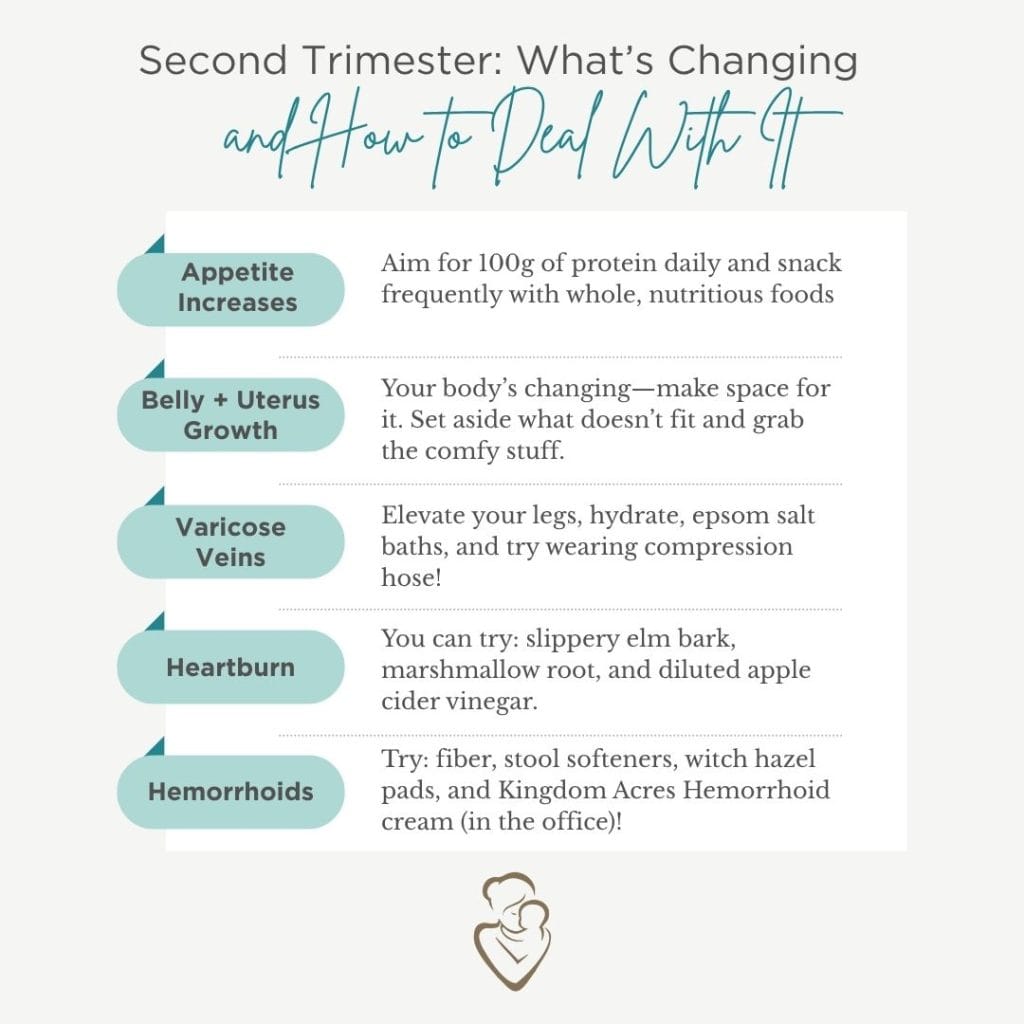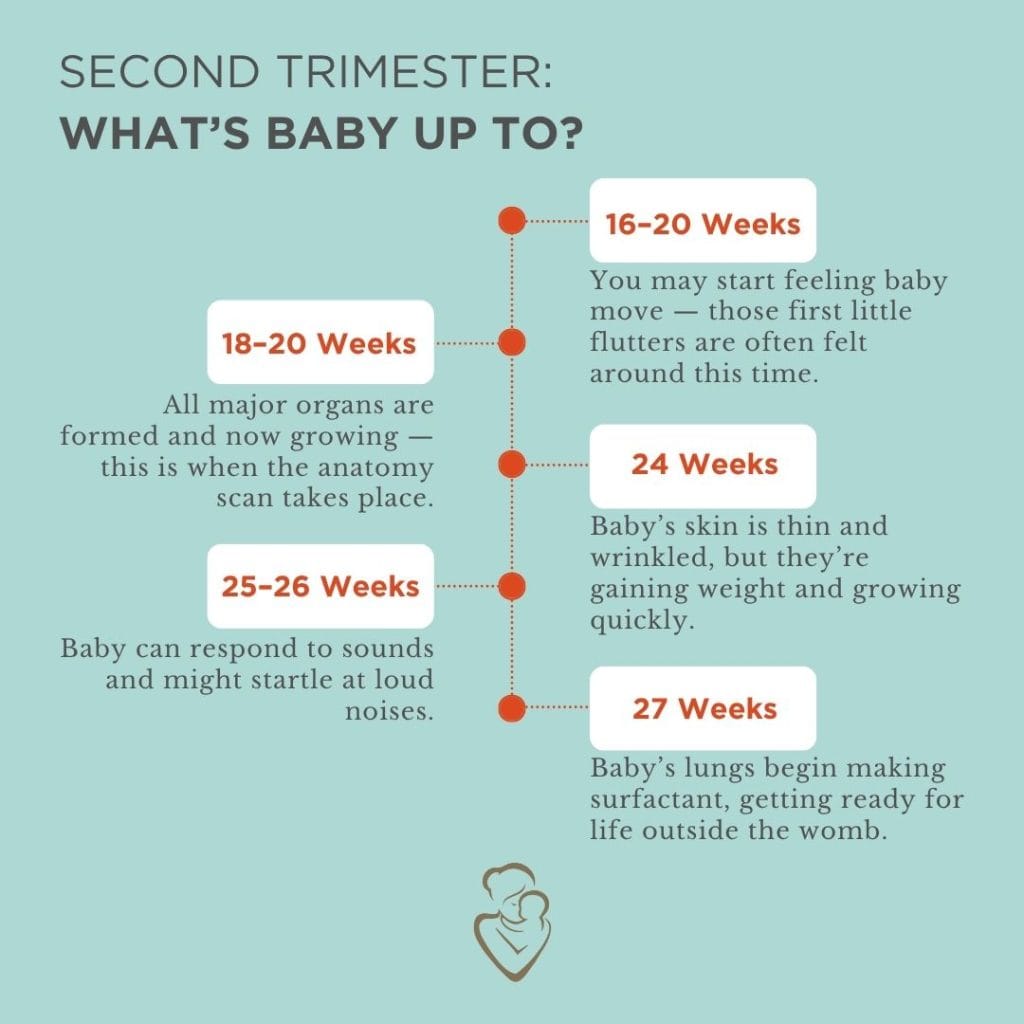

The second trimester — spanning 13 weeks to 27 weeks — is often called the “golden period” of pregnancy.
For many women, it’s when some of the most challenging early pregnancy symptoms begin to ease, and there’s a growing sense of connection with your baby. It’s also a time of big changes in your body, your care, and your baby.
At Haven Birth and Wellness, we walk through this trimester right alongside you, supporting you, celebrating with you, and empowering you to make the right decisions for you and your family.
Second Trimester Tests and Monitoring
As you leave the first trimester behind and your baby and body continue to grow and change, your provider will likely offer a host of screening options to watch for any developing issues.
At Haven, our approach to care is rooted in partnership and informed choice. We provide education, offer recommendations, and make space for your preferences and values. Most tests are options to be discussed together rather than requirements.
Second trimester screening options, either at Haven or elsewhere, may include:
15–20 Weeks
- MSAFP Test: Some providers offer a maternal serum alpha-fetoprotein test. This blood test looks for elevated levels of a specific protein, which could suggest a higher risk for spina bifida or neural tube defects.
20 Weeks
- Anatomy Scan: At Haven, this detailed ultrasound is the only screening we require, as it provides an important and detailed look at baby’s development and organs.
- Fundal Height: Around this time, we begin measuring fundal height, or the height of your uterus, to monitor baby’s growth. This measurement will typically match your gestational age within about three centimeters.
24–28 Weeks
- Gestational Diabetes Testing: The two options for this screening include a one-hour glucose tolerance test or two weeks of blood sugar monitoring at home.
Throughout your second trimester, we’ll also continue monitoring heart tones, blood pressure, and other wellness indicators for both you and your baby.
Second Trimester: What to Expect as Your Body Changes
Appetite and Nutrition
As the nausea and food aversions of early pregnancy (hopefully) fade away, you’ll likely notice your appetite increasing. This is a perfect time to focus on meeting your protein needs. We recommend aiming for about 100 grams daily to support your baby’s growth and your energy needs.
Breast Changes
Your breasts will continue to change throughout the second trimester. You might notice they’re larger and more veiny, and your nipples and areolae may darken. The little bumps around your areolae (Montgomery tubercles) might appear more prominent. Some women start leaking colostrum as early as 16 weeks.
Your ribcage will also begin expanding to accommodate your lungs and growing uterus. This is a great time to invest in some comfortable nursing bras that are a bit roomier than you normally wear.
Varicose Veins
The combination of increased blood volume, relaxed blood vessels (thanks to progesterone), and pressure from your growing belly can lead to varicose veins. If you develop these, you might find relief from:
- Taking Epsom salt baths
- Elevating your legs
- Staying well-hydrated
- Wearing compression hose
- Using kinetic tape to help support your belly
Weight Gain
During the second trimester, most women begin gaining weight more consistently. Your recommended weight will vary depending on your pre-pregnancy weight, but gaining about a pound a week is typical after 20 weeks.
As midwives, we’re particularly looking to ensure that you’re gaining rather than losing, that you’re getting all necessary nutrition from a well-rounded, whole-food diet, and that your baby is growing well. While we’re not strict about weight at Haven, we know that gaining significantly less or significantly more than what’s recommended can be linked to problems.
Uterus and Belly Growth
During this stage, your growing uterus moves up out of the pelvis and into the abdomen. You’ll likely notice your belly growing more quickly, and maternity clothes might start to feel more comfortable.
Skin Changes
Your skin also has work to do during pregnancy as it stretches and adapts. Common changes you might notice include:
- Stretch marks: As your skin stretches to accommodate baby, you may develop stretch marks (or not — either is normal!).
- Itchy belly: Your stretching skin may itch, but oatmeal baths, belly oils, and good moisturizers can provide relief.
- Chloasma: Darkening patches of skin may appear on your face.
- Linea nigra: A vertical line sometimes darkens down the center of your belly.
While these changes are normal, let your provider know if you develop a rash or your palms and feet become itchy. Most pregnancy-related skin issues appear in the third trimester, but we always want to check out any anomalies.

Heartburn
As pregnancy progresses, moms may begin to experience heartburn, even if they’ve never had it before. For relief, we see great results with:
- Slippery elm lozenges: Thayer’s brand is a favorite
- Marshmallow root: For tea, steep 1 tbsp in 1 cup water for 30 min; for supplements, take 2 capsules, 2–4 times per day
- Digestive enzymes: Especially pepsin and hydrochloric acid (HCL) capsules or tablets
- Apple cider vinegar: 1 tbsp diluted in water before meals
- Baking soda: ¼ tsp in 4 oz water after dinner
- 10 raw almonds: Chewed slowly
For many people, it’s also helpful to avoid:
- Known trigger foods
- Eating right before bed
- Lying flat to sleep (try propping up slightly)
- Mint (except inhaled) since it relaxes the lower esophageal sphincter, allowing stomach acid to flow upward
Hemorrhoids
Hemorrhoids can show up or worsen in the second trimester due to increased pressure and circulation changes. What helps:
- Increased fiber and fluid intake (to reduce constipation)
- Stool softeners or magnesium glycinate or citrate (also to reduce constipation)
- Symptom-relief products like Kingdom Acres Hemorrhoid Cream (which we carry in our office), H-salve, witch hazel, or Preparation H
- Tucks Medicated Cooling Pads
Second Trimester: Baby’s Growth and Development
Movement
One of the most exciting milestones of the second trimester is feeling those first little flutters of movement.
This can begin as early as 16 weeks, especially in second or third pregnancies, but any time between 16 and 20 weeks is common. If you’re a first-time mom or have an anterior placenta (where the placenta attaches to the front wall of your uterus), you might not feel movement until closer to 20 weeks or even later.
These early movements are often subtle and intermittent. It’s not until 28 weeks (the third trimester) that we expect regular, trackable movement — like 10 kicks in 2 hours.

Development
At this point, all your baby’s organs are formed, just needing time to develop and mature. Your baby is growing rapidly, with their unique features becoming more defined each week.
If you’re curious about a week-by-week breakdown of fetal development in the second trimester, this Mayo Clinic guide is a great place to look!
Embracing the Second Trimester
The second trimester is a beautiful season of pregnancy. There’s often a little more ease, a little more energy, and a deepening connection with your baby as you watch and feel their growth unfold.
At Haven, we’re here to walk with you through every step — answering your questions, supporting your choices, and making space for your unique experience to unfold.
Let your birth team know how we can support you during your second trimester. We’re always here to listen and guide!

